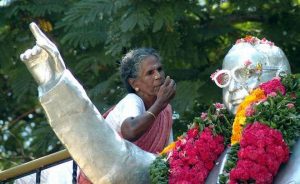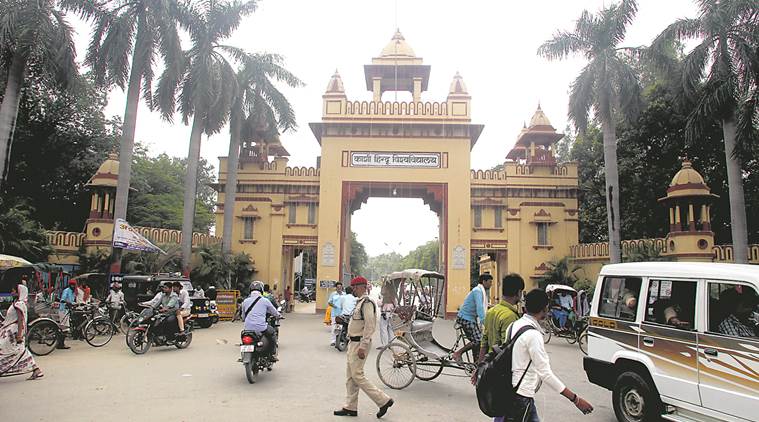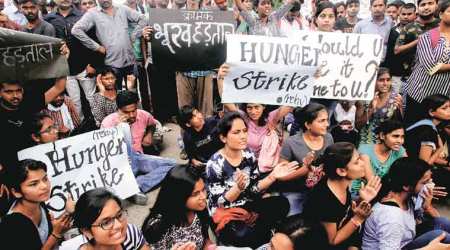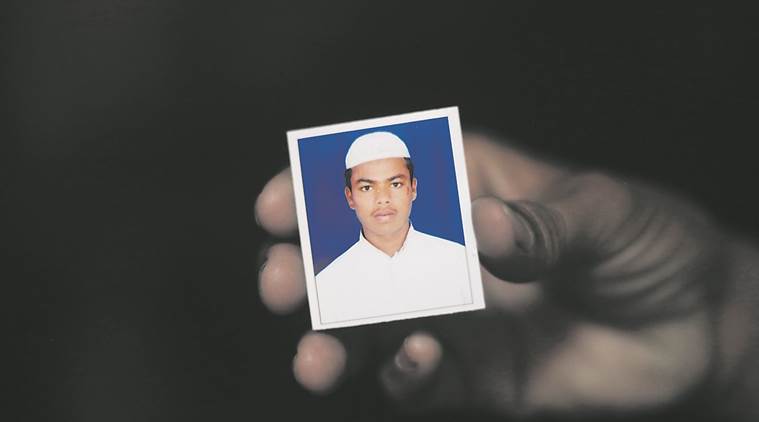The house on Primrose Hill
Ananya Vajpeyi OCTOBER 13, 2017
13THAMBEDKAR
The search for freedom can take many forms that need not be overtly ‘political’. | Photo Credit: T. Singaravelou
Underlying Ambedkar’s crusade to annihilate caste was a fundamental desire for freedom
On October 14, 1956, Dr. B.R. Ambedkar converted to Buddhism during a massive public ceremony held in Nagpur, at a place thereafter named Deeksha Bhoomi. He took Buddhist vows in order to reject his Hindu birth at the very bottom of the caste order, and because, as he declared: “I like the religion that teaches liberty, equality and fraternity.” More than 400,000 people, most of them born Dalit, underwent the conversion, along with him, on that historic day 61 years ago.
The blue plaque
In the London borough of Camden, on Primrose Hill, No. 10 King Henry’s Street is a townhouse that bears a round blue plaque, announcing its historical significance: “Dr. Bhimrao Ramji Ambedkar, 1891-1956, Indian crusader for social justice, lived here 1921-22”. On an evening in late September as I stood on the sidewalk looking at the building – bought by the government of Maharashtra in 2015, but yet to be opened to the public as a museum – I thought about what that house represented.
Ambedkar lived there as a boarder during his final years as a graduate student. He was over 30, married since he was 17, with a young wife and a small son back home in Bombay. He and his wife had lost two children in infancy. He had resigned his position as the Military Secretary to the Maharaja of Baroda, breaking a bond of 10 years of service in exchange for a scholarship to study abroad from 1913 to 1917. This displeased both the Baroda Maharaja as well as other powerful persons in Bombay, but Ambedkar was determined to complete his studies overseas, even at his own expense.
From 1918 to 1920 he taught political economy at Sydenham College, and saved money to return to England. He was now racing to complete a doctorate at the London School of Economics — his second PhD after the one he got at Columbia University in New York — as well as a law degree at Gray’s Inn, London, before he ran out of time and funds.
According to his biographer Dhananjay Keer, Ambedkar lived a frugal, penurious life in those years, braving hunger, poverty and loneliness to gain extraordinary educational qualifications. He read voraciously from morning to night at the British Museum Library, the India Office Library and the University of London Library. He was forced to borrow money from his Parsi friend Naval Bhathena. After he had earned his American and British degrees, he proceeded to Bonn, in Germany, to study even further. Only when he had exhausted his savings in 1923 did he head back to India, where his double career in law and politics began in earnest.
The thought of the hardship that Ambedkar withstood to equip himself with impressive academic titles brought me back to the very same house again the next morning. It struck me that the house memorialises not just another passage in Ambedkar’s early life, but rather, his profound desire for freedom. He wanted freedom from caste, from humiliation, from racism, from colonialism — from every kind of discrimination whether in India, America or England, that he had experienced throughout his life.
Knowledge sets you free
“Sa vidya ya vimuktaye,” runs an ancient Sanskrit verse fragment that Indian schools and universities sometimes use as their motto – “whatever liberates, that is knowledge”. I have always understood Ambedkar’s revolt against caste as a quest for equality and justice. I perceived his drive to become more educated than his privileged, upper caste, nationalist elite contemporaries as an effort to overcome the stigma of his ‘untouchable’ birth. But for the first time I saw that underlying his crusade to annihilate caste, including through hard-won personal achievements, was a fundamental desire for freedom.
The search for freedom can take many forms that need not be overtly ‘political’. In a piece in The New York Times on September 15, the Arab writer Mansoor Adayfi, a former detainee at Guantánamo, describes how prisoners longed to catch a glimpse of the sea all around them, that they were debarred from seeing. Adayfi’s essay is moving in how it conveys the human longing for freedom, which seems to run even deeper than our cultural identities and political circumstances, to be hardwired into our very souls.
After years of denying prisoners the sight of the sea, camp authorities took down the barriers for fear of a hurricane approaching Cuba. For a few precious days, there was an eruption of art, poetry and creative expression among the inmates. On seeing the reactions of his fellow prisoners, many of them Afghans who had never seen the sea, Adayfi understood that “the sea means freedom no one can control or own, freedom for everyone. Each of us found a way to escape to the sea.”
Freedom song
Closer home, the Tamil novelist Perumal Murugan, hounded by right-wing critics for writing about his own Gounder community, has penned a number of poems. Some of these are addressed to the local deity, Madhorubagan (Ardhanaarishwara, a half-male, half-female fusion of Shiva and Parvati). Others are themed on the five elements (pancha-bhuta) as also the landscapes, flora and fauna of his native Kongu Nadu, a part of the broader Tamil region. His use of the dialect of this area heightens the authentic flavour of his poetry. The palm tree (Palmyra or Toddy Palm, panai maram in Tamil) is for him emblematic of home and roots.
In a decision revealing a keen and canny aesthetic imagination, Murugan has gifted his poems to the Carnatic vocalist T.M. Krishna, who has been tuning and releasing them of late. The singer gives a voice to his writer friend who has had to endure censorship and intimidation to the extent of committing “authorial suicide” for a period of time.
Together they protest the repeated attack on the freedom of expression — the deadly threat that took the life of Gauri Lankesh. Krishna’s gesture of solidarity beautifully breaks the silence, amplifying Murugan’s call for free speech and his assertion of the right to dissent in a democracy.
In the course of an on-going engagement with Krishna’s music and ideas, I have been following Murugan’s poetry in translation. His viruttams (shlokas in Tamil) express anguish to his beloved deity Madhorubagan, asking for protection and acceptance. His kirtanas to the elements celebrate the very land and language that have inspired and nurtured him. He takes comfort in nature and verse as he experiences alienation and injustice from his fellow caste-members and their bellicose backers in the Hindu Right.
One of Murugan’s most vivid compositions is a kirtana to the wind, “Kaatru”. Krishna has set this to the winged raga Nalinakaanti, conveying the swift, airborne quality of the subject. The poem is about the unbridled force of the wind, that can never be tamed or controlled, that goes where it pleases, touches whom it likes, wipes away boundaries and divisions, tears down walls and obstructions, and sweeps across the earth unimpeded. Murugan’s words, carried aloft on Krishna’s tune, make the wind a metaphor for the freedom that is denied to him as a writer in an illiberal dispensation.
The wind is nothing other than life’s breath – without breath, as without freedom, there is only death. “You are a being of untold freedom,” writes Murugan, sings Krishna. The yearning of the censored and banned artist Perumal Murugan – of every person whose freedom is snatched away, regardless of her story or situation – flows perfectly in Krishna’s voice, imbued with his special note of compassion. You can hear the unmistakable timbre of empathy that Krishna brings to bear on art and politics alike.
Like knowledge for Ambedkar, like the sea for Adayfi, like the wind for Murugan, the longing for freedom is synonymous with our very existence as feeling, thinking human beings. We must seek that freedom, and to survive, we must find it, whatever the impediments in our path. To deny us freedom is to deny us life. At the house on Primrose Hill, I could see through the window a banner hanging inside. It carried Ambedkar’s declaration explaining why he chose Buddhism over Hinduism: “I like the religion that teaches liberty, equality and fraternity.” Freedom is first on his list.
Ananya Vajpeyi is currently a Visiting Fellow at the Centre for Research in the Arts, Social Sciences and Humanities at Cambridge University
Copyright© 2017, The Hindu

 Outside Banaras Hindu University. (Express Photo by Anand Singh/File)
Outside Banaras Hindu University. (Express Photo by Anand Singh/File)
 This should lead to serious soul-searching in India where Junaid, a young man, looking forward to Eid , was first abused and then brutally knifed to death while his brother lies wounded in a hospital.
This should lead to serious soul-searching in India where Junaid, a young man, looking forward to Eid , was first abused and then brutally knifed to death while his brother lies wounded in a hospital.